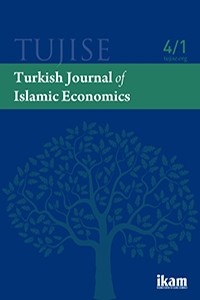THE EFFECT OF RETAIL CREDITS ON BANK PROFITABILITY: A COMPARATIVE EMPIRICAL ANALYSIS
THE EFFECT OF RETAIL CREDITS ON BANK PROFITABILITY: A COMPARATIVE EMPIRICAL ANALYSIS
Retail credits became an important instrument of banking as of 1960s. The effect of retail credits, in which mortgage and consumer credits have a great share, in the profitability of banks have not been analyzed in detail so far. The main items of retail credits, like mortgage and consumer credits, contribute greatly to the risk management of banks with their characteristics like having regular cash flow in banks. Due to the structure of the guarantee and mortgage credits, which provide low risk weight, it is important to determine the capital needs of banks. However, due to relatively long maturity structure, mortgage credits also feed the maturity mismatch risk, which is the basic problem of banking system. Such credits, with which low costs are provided in favor of the clients, play determinant roles in the profitability of banks. Consumer credits, on the other hand, are provided to the clients in shorter maturity periods and with costs that are in more favor of banks. In the scope of this study, the effects of retail credits on conventional banks and participation banks, which are active in Turkey, have been investigated over mortgage and consumer credits. The findings of the study show that retail credit types have strong negative effects on Net Interest Margin (NIM), which has been selected as the profitability indicator for conventional banks in the scope of the study. For Participation Banks, on the other hand, unlike conventional banks, retail credit types have stronger and more positive influences on Net Profit Share Margin (NPSM). The findings of the present study are important for further studies that will be conducted on retail banking and for comparative studies on performance assessments.
Keywords:
retail credits, profitability, Islamic banking, comparison, participation banking,
___
- Allen, L., DeLong, G., & Saunders, A. (2004). Issues in the credit risk modeling of retail markets. Journal of Banking & Finance, 28(4), 727-752. Bluhm, C., Overbeck, L., & Wagner, C. (2016). Introduction to credit risk modeling. Crc Press. Florida Cohen, A. M., & Mazzeo, M. J. (2007). Market structure and competition among retail depository institutions. The Review of Economics and Statistics, 89(1), 60-74. Calder, L. (2009). Financing the American dream: A cultural history of consumer credit. Princeton University Press. Dinc, Yusuf, (2017). Banka Pazarlaması ve Yeni Nesil Banking, Beta, Istanbul, Hasan, I., Schmiedel, H., & Song, L. (2012). Returns to retail banking and payments. Journal of Financial Services Research, 41(3), 163-195. Hirtle, Beverly J.; Stiroh, Kevin J. (2005) : The return to retail and the performance of US banks, Staff Report, Federal Reserve Bank of New York, No. 233 Ibrahim, M. (2015). A comparative study of financial performance between conventional and Islamic banking in United Arab Emirates. International Journal of Economics and Financial Issues, 5(4). Menor, L. J., & Roth, A. V. (2008). New service development competence and performance: an empirical investigation in retail banking. Production and Operations Management, 17(3), 267-284. Mollah, S., Hassan, M. K., Al Farooque, O., & Mobarek, A. (2016). The governance, risk-taking, and performance of Islamic banks. Journal of Financial Services Research, 1-25. Tschoegl, A. E. (1987). International retail banking as a strategy: an assessment. Journal of International Business Studies, 18(2), 67-88. Youssef, A., & Samir, O. (2015). A comparative study on the financial performance between Islamic and conventional banks: Egypt case. International Journal of Business and Economic Development (IJBED), 3(3).
- Başlangıç: 2014
- Yayıncı: Research Center for Islamic Economics (ikam)
Sayıdaki Diğer Makaleler
INTEREST RATE RISK IN INTEREST-FREE BANKS: AN EMPIRICAL RESEARCH ON TURKISH PARTICIPATION BANKS
Methodology of Islamic Economics From Islamic Teachings to Islamic Economics
THE EFFECT OF RETAIL CREDITS ON BANK PROFITABILITY: A COMPARATIVE EMPIRICAL ANALYSIS
Do Islamic Banking standards convey more financial transparency than conventional banking ones?
